|
|
|
Sort Order |
|
|
|
Items / Page
|
|
|
|
|
|
|
| Srl | Item |
| 1 |
ID:
160026
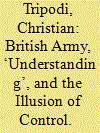

|
|
|
|
|
| Summary/Abstract |
Over the past decade, Western military doctrines concerned with matters of irregular warfare and counterinsurgency have emphasised the requirement for properly ‘understanding’ the social, political and cultural environments in which those militaries may operate; the so-called human and socio-political ‘terrain’. This has led to a number of advancements and initiatives designed to facilitate the way that militaries may enhance that understanding. One of those initiatives has been the emergence from within the British military of a doctrine – JDP 04 ‘Understanding’ – designed for that purpose. Using that doctrine and other subsequent publications as a template, this article will examine the utility of ‘understanding’ for those commanders seeking to match military activities with political ends. It proposes that while any advances in understanding the operating environment are to be applauded, the ‘understanding’ of greatest importance is that relating to the feasibility of the strategic objectives at hand. If those objectives lack inherent feasibility, then the development of subordinate forms of understanding, particularly in relation to the socio-political dynamics of target societies, will likely only serve to slow the process of failure.
|
|
|
|
|
|
|
|
|
|
|
|
|
|
|
|
| 2 |
ID:
085950
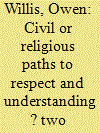

|
|
|
|
|
| Publication |
2009.
|
| Summary/Abstract |
While trends towards secularization may have appeared inexorable as the last century came to a close, more recent events, particularly in the aftermath of 9/11, have led to greater attention being paid to the resurgence of religion globally. But how to represent and portray religion, with respect and understanding, in this new environment may contain significant challenge-a subject which this paper considers in the light of two recent Commonwealth Reports. The Report of the Commonwealth Commission on Respect and Understanding, entitled Civil Paths to Peace, chaired by Amartya Sen, and presented recently to the Commonwealth Heads of Government summit in Kampala, Uganda, seeks to downplay any single-minded concentration on religion in favour of promoting broader civil engagements in crafting civil paths to peace. In contrast, the Commonwealth Foundation's Report, Engaging with Faith, treats religion more sympathetically and encourages understanding and cooperation between the faith communities. The former Report may tend to treat religion as part of the problem, while the latter might view religion as part of the solution. Thus, the two Reports illustrate contrasting and conflicting views as to the place of religion in efforts to promote global peace and development along the path to respect and understanding.
|
|
|
|
|
|
|
|
|
|
|
|
|
|
|
|
| 3 |
ID:
128181
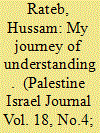

|
|
|
|
|
| Publication |
2012.
|
| Summary/Abstract |
We are still fighting - only the battle has become a shared one; it is for peace, justice and understanding.
|
|
|
|
|
|
|
|
|
|
|
|
|
|
|
|
| 4 |
ID:
193063
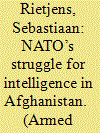

|
|
|
|
|
| Summary/Abstract |
What role did North Atlantic Treaty Organization (NATO) and the coalition (International Security Assistance Force—ISAF) it led play in the failure of the West in Afghanistan? This essay argues that the ISAF intelligence community’s inability to come to grips with the complex operational environment in Afghanistan contributed to the problem. Using three concepts from the complexity literature, requisite variety, learning, and enactment, I analyze critical flaws in NATO’s approach. ISAF’s weak cross-cultural competence, its inconsistent relationships with international civilian organizations, and its absence of double- and triple-loop learning are identified as key drivers of NATO’s weak intelligence performance.
|
|
|
|
|
|
|
|
|
|
|
|
|
|
|
|
| 5 |
ID:
157232
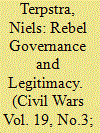

|
|
|
|
|
| Summary/Abstract |
Based on extensive fieldwork in Sri Lanka, we analyze how the Liberation Tigers of Tamil Eelam (LTTE) acquired legitimacy and how legitimation impacts civilian perceptions of the rebels. Despite the LTTE’s reliance on coercion to induce compliance, civilians also supported the LTTE and their imagined state of Tamil Eelam voluntarily. Different LTTE strategies and acts helped creating legitimacy. Effective forms of legitimation were rooted in Tamil nationalism, tradition, charismatic leadership, sacrifices made by LTTE cadres and the people’s need for protection. However, the strong reformative socio-political agenda of the LTTE largely failed to engender legitimacy among the population.
|
|
|
|
|
|
|
|
|
|
|
|
|
|
|
|
| 6 |
ID:
161293
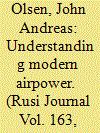

|
|
|
|
|
| Summary/Abstract |
Despite its significance in international relations and statecraft, the phenomenon of airpower remains controversial and little understood beyond its tactical and technological manifestations. This article examines 24 themes that scholars and practitioners must study to attain an in-depth, broad-ranging and contextual understanding of airpower. While all the themes are important, in combination they offer a comprehensive insight into airpower as a political instrument of war and peace.
|
|
|
|
|
|
|
|
|
|
|
|
|
|
|
|
| 7 |
ID:
086016
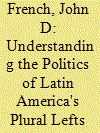

|
|
|
|
|
| Publication |
2009.
|
| Summary/Abstract |
This article explores the academic and public debate on the politics of Latin America's twenty-first century turn towards the left. It rejects dichotomous categorisations of 'social democratic' and 'populist' lefts as a disciplinary move by neoliberals that appeals to entrenched liberal predispositions. It suggests that such classificatory taxonomies are directly linked to an impoverished notion of the political, in which a politics of exalted expertise and enlightenment, based on reason, rationality and objectivity is juxtaposed against a lesser sphere of emotion, passion and 'personalism'. This underlying dualism, which permeates academic disciplines and crosses lines of ideology, tracks established markers of hierarchical distinction in societies profoundly divided along multiple lines of class and cultural capital. This is explored through an analysis of the discourse of Ch vez vis-a-vis Lula, while offering an appreciation of the subaltern origin of Lula's distinctive style of political leadership, from trade unionism to the presidency, based upon the creation of spaces of convergence.
|
|
|
|
|
|
|
|
|
|
|
|
|
|
|
|
| 8 |
ID:
178097
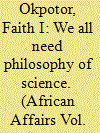

|
|
|
|
|
| Summary/Abstract |
Explaining and Understanding are considered mutually exclusive in political research. In this view, Explaining involves making observations as an outsider, with emphasis on causal laws, generalizations, and predictions. Conversely, Understanding occurs from the inside, with emphasis on meaning-making. This research note addresses Explaining, Understanding, and the related concept of reflexivity in multi-method/mixed-method research involving fieldwork. Rather than taking for granted the dichotomy between Explaining and Understanding that stems from Cartesian anxiety, I argue for the non-mutually exclusive alternative of ‘explanatory understanding’ and propose analyticism as the appropriate methodological path. An analyticist methodology involves creating a model that is a general account of a phenomenon, which is then used in case-specific analytical narratives to reveal departures from the model. Since understanding requires adequate explanation, explanatory understanding helps us better make sense of the world. Therefore, Explaining and Understanding are not merely oppositional stances between identifying causes and making sense. We cannot identify causes without making sense, and making sense involves a degree of causal inference. Explanatory understanding also necessitates reflexivity, which I conceptualize as methodological and personal positionality. I apply these arguments to my study of post-election violence in West Africa, drawing on fieldwork experience in Ghana, Nigeria, and Côte d’Ivoire.
|
|
|
|
|
|
|
|
|
|
|
|
|
|
|
|
|
|
|
|
|